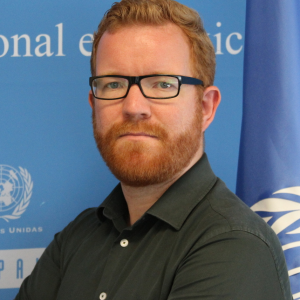Jamaican Economy Panel expects slow recovery despite positive review of Government policies
30 April 2021
KINGSTON - Today, the Jamaican Economy Panel (JEP) presented the results of its inaugural discussion which focused on the country’s recovery from COVID-19.
The Jamaican Economy Panel is a new initiative and partnership between the United Nations Resident Coordinator’s Office (UNRCO) and the Department of Economics at The University of the West Indies (UWI) Mona. The JEP brings together a select group of economic and public sector experts to address a monthly series of socioeconomic questions. These questions help to highlight relevant economic issues and to shine a light on the collective wisdom of the experts who make up the panel.
Dr. Garry Conille, Resident Coordinator said: “The JEP is a great example of how the United Nations can cooperate with academia and other professionals to unearth and utilize their expertise to solve some of our socio-economic issues.” He continued to say that “the cooperation with the Department of Economics at UWI is especially valuable and I look forward to further engaging with the academic sector in Jamaica.” The experts participating in the JEP represent a wide range of academic, private sector and international institutions.
Impact of COVID-19
During the first round of the JEP, panellists were asked about the economic impact of COVID-19. While the respondents were reasonably positive about the government response to COVID-19, they acknowledged that the Jamaican economy has certain weaknesses, including the high level of debt, that have bound the government’s policy space.
As a result, the average respondent predicted that the Jamaican economy will not return to its pre-COVID level of GDP until 2024. Many of the panelists were doubtful that the Jamaican economy would be able to significantly improve on its pre-COVID economic growth record, which would therefore mean that said recovery would necessarily take several years.
Finally, the panellists were asked about the type of policies they believe would support the economic recovery. The overwhelming majority supports increases in capital expenditures, investing in MSMEs, infrastructure, and similar areas. Another large majority also believes that increases in social spending (such as PATH benefits) would help families live through the hardship. Nevertheless, several panellists cautioned that the fiscal challenges for Jamaica continued to be great and that the national debt should not be allowed to get out of hand.
Dr. Nadine McCloud, head of the Economics Department at UWI Mona and a co-founder of the JEP stated that “the results show broad support for current government thinking, even if the panellists are somewhat more pessimistic about the economic recovery than other sources are.” She continued by saying that “the value of this exercise is that it highlights the uncertainty surrounding the recovery, while at the same time, highlighting the importance of vigilance with regards to government policy.”
The other co-founder of the JEP, Dr. Olaf J. de Groot, Economist at the UNRCO highlighted that JEP discussions on key economic issues would occur monthly and would be packaged and presented for the clarity for the wider population.
“We look forward to taking the opportunity on a monthly basis to survey these experts and share the results with the greater public in Jamaica. I believe there is value in collating these different opinions so that one can show both the agreements and the disagreements amongst experts,” Dr. Olaf J. de Groot said.
For more information on JEP and for the complete results of its first discussion visit HERE.





